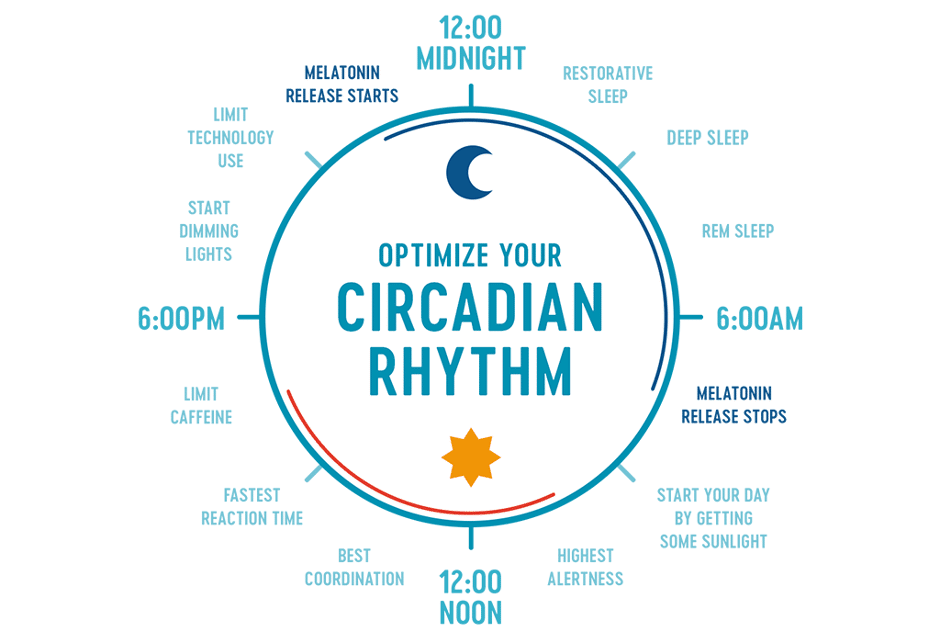By Alexandra Berecry (Naturopath)
Your body’s physiological processes are the result of millions of years of adaptation to the forces of nature. These natural forces are the movement of the planets, sun, moon and the stars. In actual fact there is a field of science called chronobiology that examines cyclic phenomenon in living organisms and their adaptation to solar and lunar related rhythms. These cycles are known as biological rhythms. The most important biological rhythm is the circadian rhythm, a roughly 24 hour-cycle that developed in line with of the rotation of the earth around the sun. Many aspects of our physiology are directed by our circadian rhythm, including sleep, appetite, alertness, hormone levels, body temperature, immune function and digestive activity. The circadian rhythm is communicated to the various systems in our body by a diurnal interplay of two hormones: our body systems can tell what time it is (and therefore what they should be doing) based on the relative levels of cortisol and melatonin. There are high levels of cortisol in the morning that gradually drop throughout the day, replaced by increasing levels of melatonin in the evening.

Modern day life has resulted in a gross departure from these natural rhythms. No longer do our daily lives work in sync with the movement of the sun or seasons. Our natural state is to wake with the sun and wind down as it sets. To step outside of the normal sleep-wake cycle means forcing your body to do something it wasn’t designed to do. Without being aware of it, this is one of the most common forms of chronic stress we subject our bodies to every day, a stress which, until the invention of electricity and artificial light in the mid 1800’s, didn’t exist. Think about that for a minute, for millions of years our biological systems worked in harmony with the rise and fall of the sun and in the relative blink of an eye it has all gone out the window. Netflix marathons in lockdown anyone?
If you are out of sync with a normal circadian rhythm for long enough there are guaranteed biological consequences in both the short and long term. To be out of step with this normal cycle wreaks havoc with your mental, emotional, biochemical, visceral and musculoskeletal systems leading to health complaints such as chronic fatigue, depressed immune function (recurrent colds and flu’s), digestive disturbances, poor memory and brain fog, anxiety and depression and generalized inflammation to name but a few. The most common consequence of circadian rhythm disruption is insomnia.
If you are suffering from any sort of health complaint there is nothing more important than re-establishing this normal rhythm in your life. Here are some tips for restoring your circadian rhythm:
1.
Try to wake with the sun (roughly at 6am) every day. Exposure to sunlight during the day, as well as darkness at night, helps to maintain a healthy sleep-wake cycle. In order to set up your cortisol production for the day you need to be exposed to full spectrum light within the first 30 to 60 minutes of waking, so instead of hitting the snooze button open your blinds and let the light flood in (or even better get outside for 10-20 minutes). If you’re unable to get outside in this time, try a full spectrum light box (can be purchased from Amazon).
2.
Be sure to have breakfast with protein before 10am: this is important to stabilizing your blood sugar, which prevents cortisol spikes throughout the day.
3.
Try to get out of the office for a sun break during the day- aim to get a total of at least 60 minutes a day of exposure to daylight.
4.
Avoid all stimulants such as caffeine (including tea) after 2pm.
5.
Have your breakfast, lunch and dinner at regular times each day. Feeding times actually form part of the peripheral signals that loop back to our central clock in our brains to reset our daily circadian rhythm. And be sure to stop for all meals and try to focus on your food. Do not eat on the run and try to perform other things like work whilst eating.
6.
In the afternoon and evening use screen-dimming apps and blue light blocking glasses to negate the impact of artificial light on your cycles
7.
Be sure to integrate activities and pass times that allow you to naturally wind down as the day progresses from afternoon to night. On that note vigorous exercise is best performed in the morning, and never within 2 hours of bed.
8.
At night one hour before going to bed dim or turn off any bright lights as well as all screens (think phones, iPads, laptops and TV). Use this time to establish a relaxing pre-sleep routine – ease the transition from wake time to sleep time with a period of relaxing activities an hour or so before bed. Try to do this every night, as a regular nightly routine helps the body recognize that it is bedtime. Take a bath or shower (the rise then fall in body temperature promotes drowsiness; aim for 40°C for at least 10 minutes an hour before bed), read a book or practice relaxation exercises (such as yin yoga or meditation).
9.
Aim to be asleep between 10 and 11pm – ever heard the saying an hour of sleep before midnight is worth two after? This is because your body needs to be asleep at this time to enter the deep sleep cycle, which is when it undergoes restoration and healing and makes many of its hormones
10.
Keeping your internal clock set with a consistent sleep schedule – going to bed and waking up at the same time each day sets the body’s “internal clock”. Try to stick as closely as possible to your routine on weekends to avoid a Monday morning sleep hangover (“social jetlag”). Waking up at the same time each day is the very best way to set your clock, and even if you did not sleep well the night before, the extra sleep drive will help you consolidate sleep the following night.
11.
Follow Through: Some of these tips will be easier to include in your daily and nightly routine than others. However, if you stick with them, your chances of restoring your circadian rhythm greatly improve.

While there’s no doubt lifestyle changes are the one non-negotiable factor in restoring your body’s natural rhythms, sometimes the disturbance can be so severe (after years of significant disruption) that these changes on their own won’t be enough. Herbs and nutritional support can make a huge difference reestablishing your body’s processes, and a Naturopath can work with you to steer you back to your normal rhythm. We can actually test your saliva for hormones that are key markers of circadian rhythm (cortisol and melatonin) to map out what your pattern is, which helps us individualize and optimize your treatment plan.
Get in touch with Ali Berecry, Naturopath at pH clinic if you would like more information, or please make a booking here- www.phclinic.com.au


